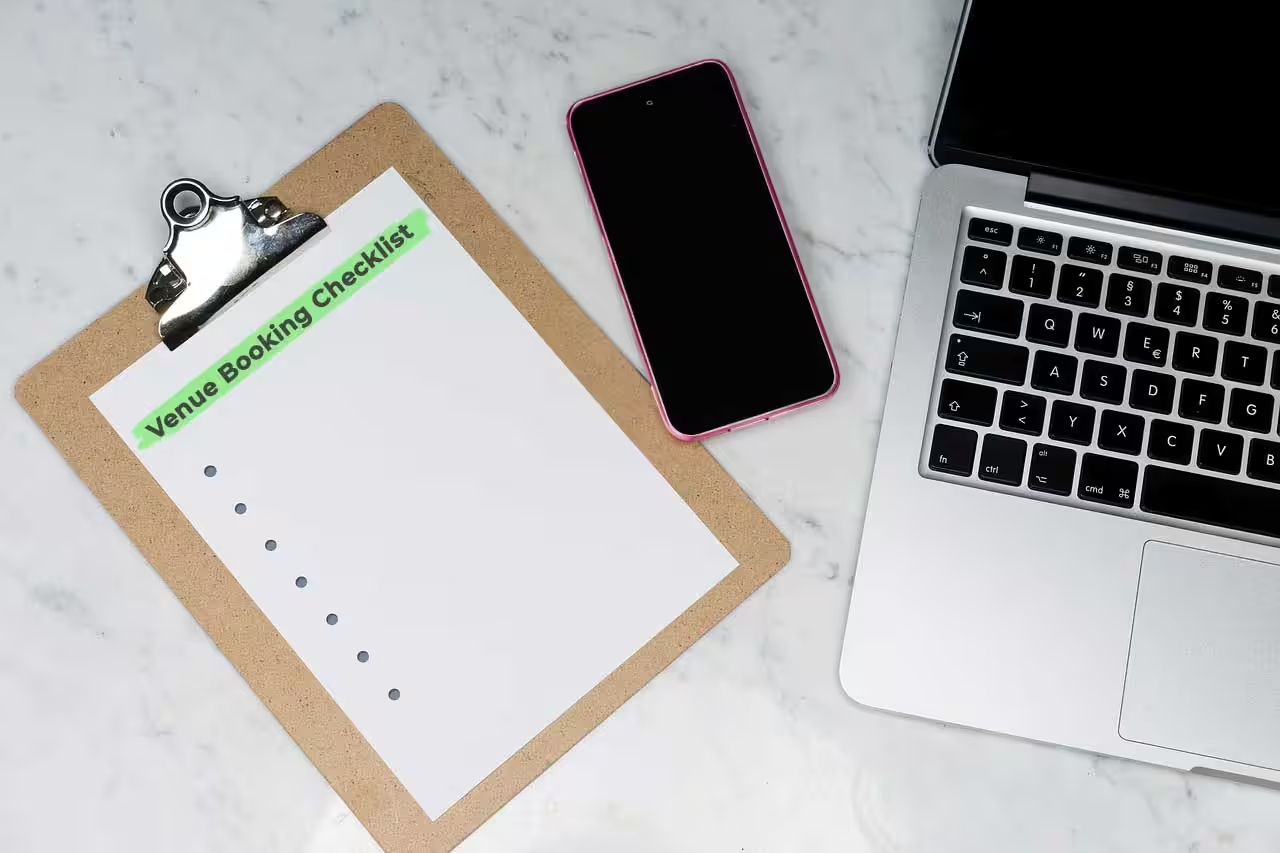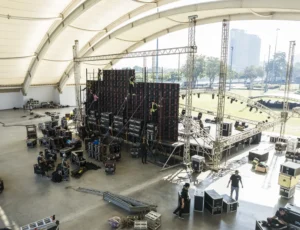Quick Summary
Whether you’re brand new to the music industry or just starting out as a tour manager, this guide teaches you how to write effective booking emails to venues. It includes templates, follow-up tips, and a downloadable toolkit.
Table of Contents
- Before You Email a Venue
- What to Include in Your Email
- Proven Email Template (with Examples)
- When and How to Follow Up
- Bonus Tips to Book More Shows
- Free Band Email Toolkit (Free Download)
- Closing
- Download All Resources in One File
- FAQs
Intro: Want More Gigs? It Starts With the Right Email
Even in the age of TikTok and DMs, email is still the #1 way bands book shows — especially with professional venues. Many musicians — and plenty of new tour managers — overthink their emails. They write long bios no one reads. And they often forget the key details that bookers actually look for.
Whether you’re in the band or managing the tour, this guide will show you exactly how to write booking emails that get responses. You’ll get a real email template, a set of pro tips, and a downloadable toolkit. These will help you land more gigs and build lasting relationships with venues.
Let’s dive in.
1. Before You Email a Venue
Whether you’re in the band or helping manage a small run of shows, these are the things you’ll need to gather before reaching out.
Booking a show doesn’t start with hitting “send” — it starts with doing your homework.
Here’s what you should prepare first.
1.1 Choose the Right Venues for Your Sound
Not every stage is the right fit. Look for venues that match your genre, suit your fanbase size, and book acts like yours — originals, covers, solo, or full band.
💡 Pro tip: Use Instagram to check out who played there recently — especially similar artists to your band or sound — and how packed it looked.
1.2 Know Your Draw
Venues want to know one thing: Will people show up? Be honest with yourself:
- How many people can you reliably bring out in that city?
- Have you played nearby before?
- Can you co-promote with a local opener?
Even if you’re new, show you’re serious about filling the room.
1.3 Gather Your Promo Assets
Don’t start emailing until you’ve got these ready:
- A live performance video (even a solid phone recording helps)
- An EPK (Electronic Press Kit) or one-pager (PDF or Google Doc is fine)
- Links: website, socials, Spotify/Apple, YouTube
- Hi-res photos: for posters/social sharing
- Press quotes or past show screenshots (optional, but powerful)
Having everything in one place makes you look pro — and saves the booker time.
📄 Need a checklist to make sure you’ve got everything?
Download our full EPK & Promo Asset Checklist (Google Docs format) as part of the free toolkit.
2. What to Include in Your Email
Venue bookers are busy. They skim fast and decide even faster. Your job is to make their decision easy — by giving them all the right info in a short, clear message.
Here’s what your email must include:
2.1 Start With a Clear, Personal Greeting
Address the booker by name if possible. Avoid “To whom it may concern” or “Hey there.”
Example:
“Hi Jamie,” or “Hi [Venue Name] team,”
2.2 Introduce Yourself in One Line
Keep it ultra-brief: who you are, where you’re from, and what you sound like.
Example:
“I’m Jordan from The Slow Fires, a four-piece indie rock band based in Chicago.”
2.3 Mention the Dates You’re Looking to Book
Be specific. Offer a 3–5 day window or a weekend. Include the month and day(s)—bookers hate vague requests.
Example:
“We’re routing through your area and looking to book a show between August 15–18.”
2.4 Share Why You’re a Good Fit
Briefly explain how you match their venue: genre, crowd size, vibe, or past performances.
Example:
“We’ve played similar 100–200 cap rooms like Schubas and The Hi Tone, and we’re looking to co-bill or support a local act.”
2.5 Add Promo Strengths
This is your value pitch. Mention:
- Draw: “We can pull ~40–50 people on a weekend in the area.”
- Online reach: “We have 3K Instagram followers and 10K Spotify monthly listeners.”
- Marketing help: “We’ll promote heavily on socials, email, and our website.”
2.6 Link to Your Assets (Don’t Attach!)
Use a bullet list or short paragraph to link directly to:
- Live performance video
- EPK or Google Drive folder
- Streaming/social profiles
Example:
- Live video: [YouTube link]
- EPK: [Google Drive link]
- Instagram: [@theslowfires]
- Spotify: [Spotify profile link]
2.7 End With a Direct Ask + Polite Close
Be clear: you’re asking to book a show. Then thank them and sign off professionally.
Example:
“Are you currently booking for mid-August? We’d love to be considered.”
“Thanks so much for your time!”
“– Jordan, The Slow Fires”
3. Proven Email Template (with Examples)
Here’s a ready-to-use email template you can customize — built using all the tips above. We’ve also included a “bad example” to show what not to do.
Good Booking Email Example
Subject: Booking Inquiry – The Slow Fires (Aug 15–18)
Hi Jamie,
I’m Jordan from The Slow Fires, an indie rock band based in Chicago.
We’re routing through your area and looking to play a show sometime between August 15–18. We’ve performed at similar 100–200 cap venues like Schubas and The Hi Tone, and we’d love to support a local act or co-bill if possible.
We typically draw 40–50 people in the area and promote shows via email, Instagram (3K+ followers), and our site.
Here are some quick links:
– Live video: [YouTube link]
– EPK: [Google Drive link]
– Instagram: [@theslowfires]
– Spotify: [Spotify profile link]
Are you currently booking for those dates? Thanks so much for your time!
– Jordan
www.theslowfires.com
jordan@theslowfires.com
📄 Want a version you can fill out and copy-paste? Use this Cold Email Template for Booking a Gig at a Venue (Google Docs format) from our free toolkit.
🔍 Why This Works
- Short & specific (under 200 words)
- Includes date window, draw, and genre
- Easy-to-skim links (no attachments)
- Clear ask and friendly tone
❌ Bad Example Booking Email
Subject: gig??
hey
we r an alt band from ohio
wanna play ur venue sometime this summer
check our ig
- the blood berries
⚠️ What’s Wrong With This
- No name or location
- No dates, no pitch, no links
- Casual to the point of sloppy
Doesn’t answer the venue’s core question: Why should we book you?
4. When and How to Follow Up
Even the best email can get buried. That’s why following up is part of the process, not a backup plan. Do it right, and you’ll increase your chances without damaging your reputation.
4.1 Wait 5–7 Business Days
Give bookers time to breathe — especially if you’re contacting a venue that books multiple nights a week. Follow up no sooner than 5 days, ideally around day 7.
4.2 Use a Simple, Professional Subject Line
Reply to your original email thread (don’t start a new one) and keep the subject line unchanged, or slightly updated with “RE:”.
Example:
RE: Booking Inquiry – The Slow Fires (Aug 15–18)
4.3 Keep the Follow-Up Short and Polite
Just one paragraph. No guilt-tripping or pressure—assume good intentions.
Follow-up Example:
Hi Jamie,
Just checking in on my note from last week about booking The Slow Fires between August 15–18. Totally understand if your calendar is full or if timing doesn’t work—just wanted to follow up in case it slipped through.
Thanks again, and hope to hear from you soon!
– Jordan
📄 Want a version you can personalize and reuse? Here’s the follow-up email template for booking a gig at a venue (Google Docs format) from our free toolkit.
4.4 When to Let It Go (or Try Another Angle)
If you haven’t received a response after one follow-up, don’t spam. Instead:
- Try a new contact at the venue (if possible)
- Look for open mic nights or event submissions on their site
- Circle back in 2–3 months with updated assets or new draw numbers
💡 Pro tip: Keep track of emails, dates, and outcomes in a simple spreadsheet—it helps you stay organized and shows which venues are responsive over time.
5. Bonus Tips That Book More Shows
Sometimes, it’s not just what you say — it’s how and who you say it to. These tactics help you build momentum, even when cold emails hit a wall.
5.1 Network Offline (Even Once Makes a Difference)
Be present at open mics, industry nights, or other bands’ sets. Say hi to the sound engineer, bartender, or opener—these people often are the gatekeepers.
One of them might even know the venue owner or be able to vouch for you directly.
🎤 Real talk: Many booking decisions come from trust, not just emails. Being a real human in the room helps a lot.
5.2 Offer to Co-Bill or Bring the Opener
Make it easy for the venue to say yes by reducing their workload. For example:
- Share a bill with a local artist (and share their contact)
- Bring your own opener or opener options
- Offer genre-aligned lineups that fit their regular programming
These small moves show initiative, save the booker time, and significantly improve your chances of getting booked.
5.3 Promote Like a Pro
A flyer isn’t enough anymore. Show venues that you’ll hustle by:
- Posting about the show multiple times
- Running low-budget Instagram ads (even $10–20 helps)
- Emailing your local fan list
Mention past promo wins, like sold-out shows, newsletter opens, or video views.
5.4 Track It All
If you’re managing shows for a small tour—or helping another band book dates—keeping a log of outreach and responses is a lifesaver. It’ll help you stay organized now, and make future routing and follow-ups way easier.
Create a simple spreadsheet to manage:
- Venue contacts
- Dates contacted
- Follow-up timing
- Notes on replies or status
📄 Want a ready-made simple spreadsheet to keep track of your outreach? Download the Band Booking Tracker (Google Sheet format) as part of the free toolkit.
If you’re looking for more advanced tools beyond spreadsheets, band management software can help centralize your bookings, contacts, and tour planning in one place.
6. Band Booking Email Checklist (Free Download)
Want to skip the formatting and just plug in your band’s info? We’ve got you covered.
Download your free band booking email checklist (Google Docs format) with everything you need to start booking gigs faster, whether you’re brand new or leveling up your tour strategy.
It’s built for bands and touring team members — especially if you’re booking your first shows or still building industry contacts.
🎁 What’s Inside:
✅ Cold Email Template – ready-to-fill format for outreach
✅ Follow-Up Email Template – short, professional nudge email
✅ Promo Asset Checklist – everything to include in your EPK or link list
✅ Booking Tracker Spreadsheet – stay organized, track responses, and follow-ups
💡 Pro tip: Save a copy of the Google Sheet to your Drive, and duplicate it for each tour cycle or city.
Closing: Booking Gigs Starts With One Solid Email
Whether you’re brand new to live shows or planning a regional run, one great email can unlock the door to your next gig. Be clear, be brief, be professional—and always follow up.
Use the tools above, customize your message, and start building real relationships with venues that’ll want to book you again.
Good luck—and don’t forget to grab the free band email toolkit!
💼 Want all the tools in one place?
Download the full Band Booking Email Resource Package (ZIP archive) — includes templates, checklists, and more.
Free for artists and tour managers.
FAQs
How long should a booking email be?
Keep it under 200 words. Short, direct emails are more likely to get read—and responded to. Aim for one screen’s worth of text on mobile.
Do I need a press kit (EPK) to email venues?
Yes, or at least a simple one-pager with your bio, links, images, and video. Venues want everything in one place, not scattered across DMs or file attachments.
What if I’ve never played a show before?
Be honest—and proactive. Offer to open for a local band, bring friends, or play an off-night. Share live rehearsal footage and show you’re ready and reliable.
How soon should I follow up after sending a booking email?
Wait 5–7 business days before following up. Keep your message polite, short, and reply in the same email thread.
Should I include streaming or social media numbers?
Yes. It helps venues understand your draw and reach. Even modest numbers show you’re active and promoting.



